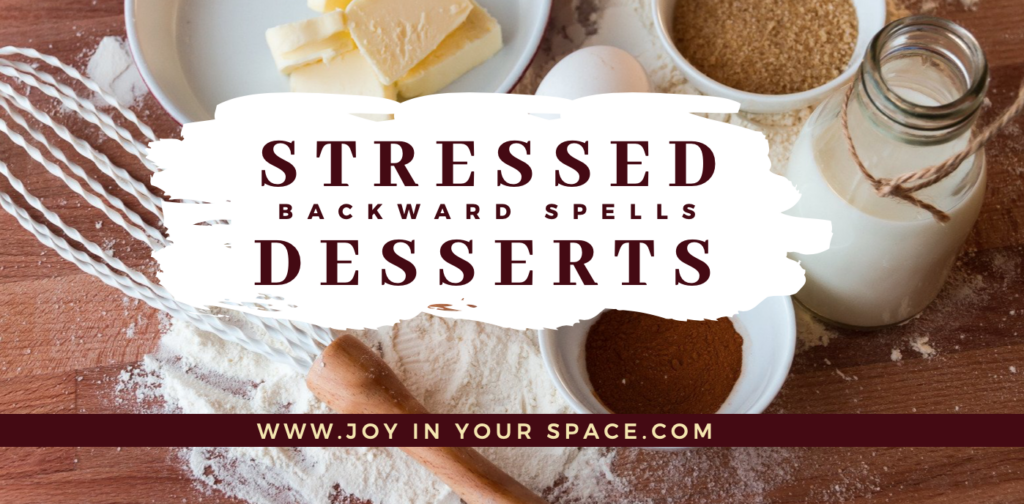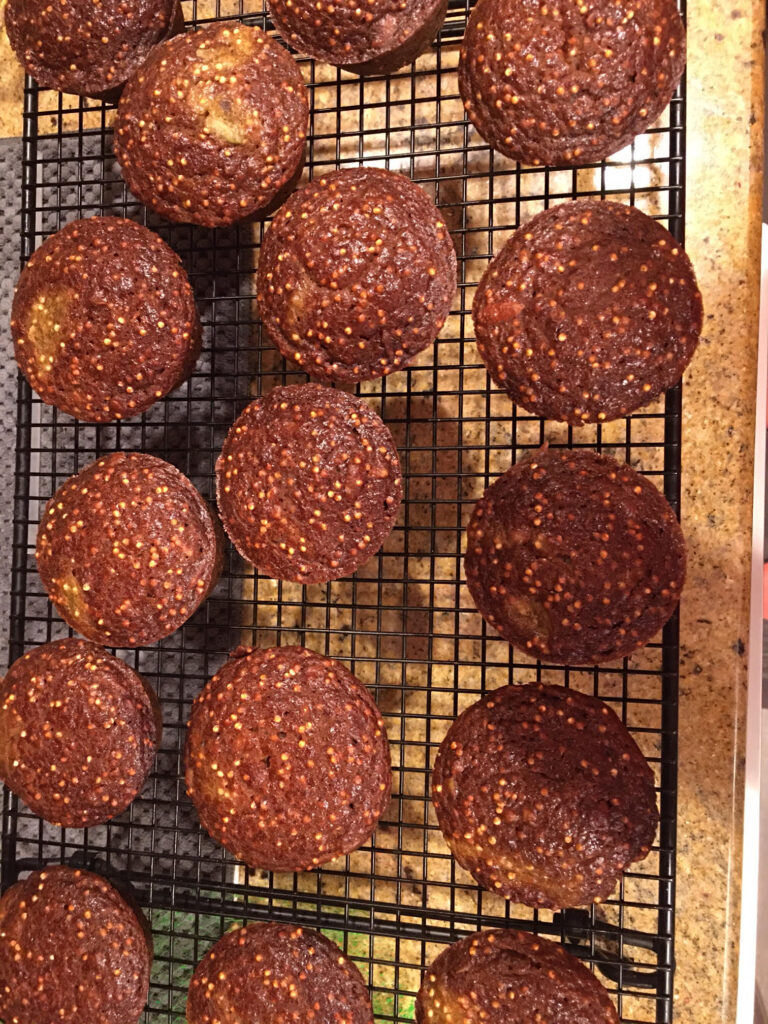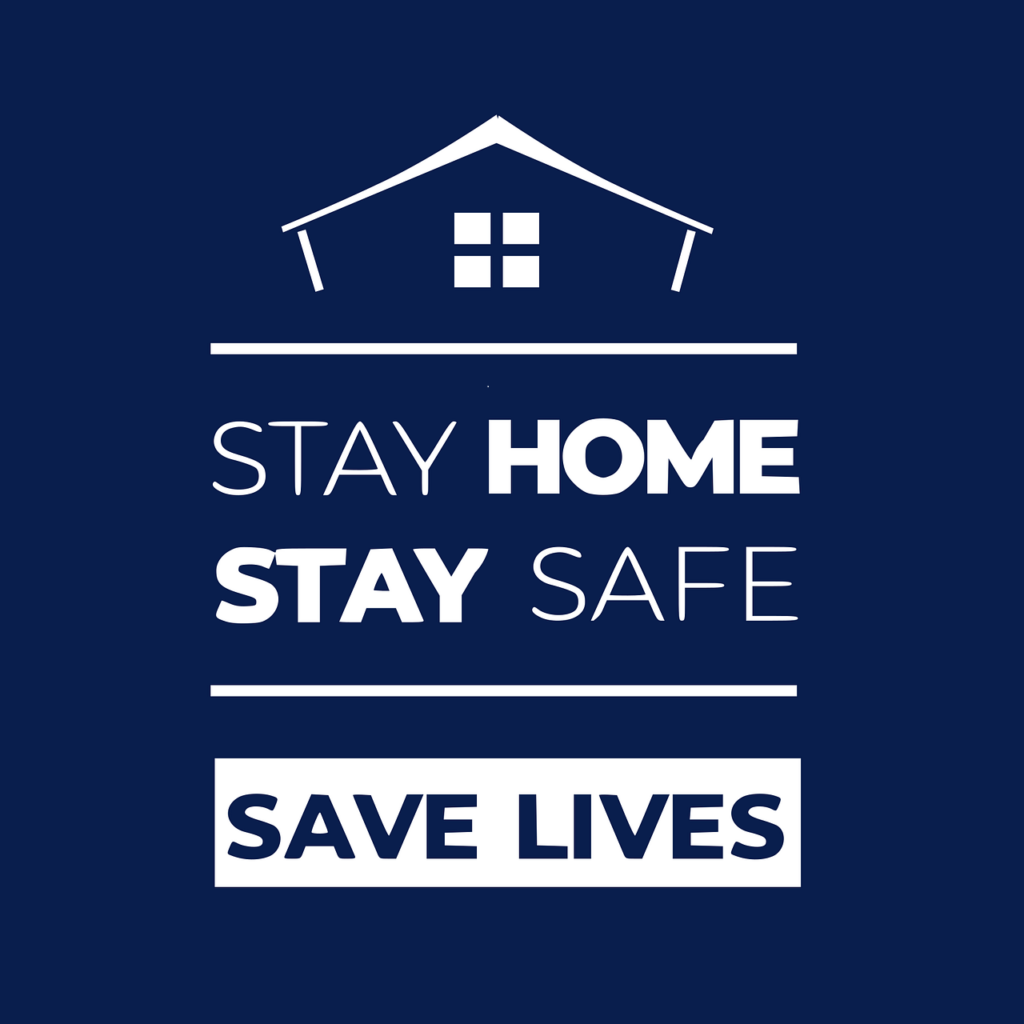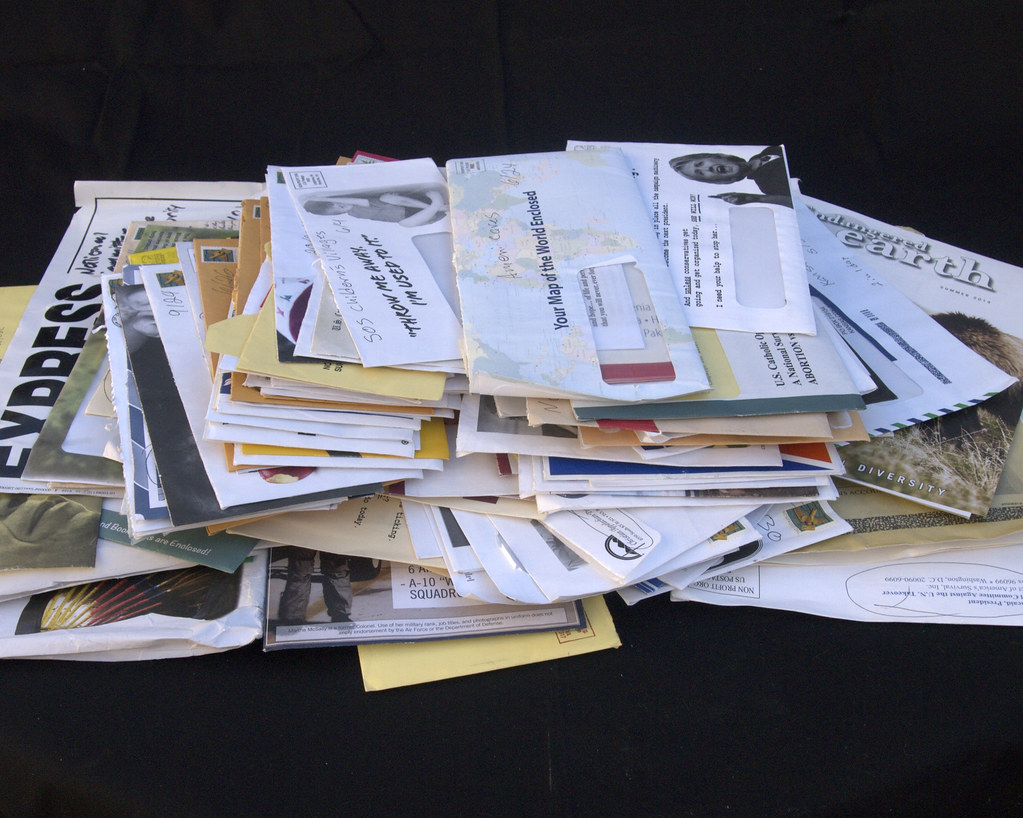While sheltering-in-place we’ve been spending a lot more time baking. And wouldn’t you know: Stressed Spelled Backwards is: Desserts!

I saw that catchy phrase after delivering my 5th batch of muffins in April. To avoid gaining the dreaded Covid-15 (think Freshman-15) I delivered Tupperwares to my neighbor, who appreciates my zero-sugar recipes.
With my last delivery of cranberry-sweetened pumpkin millet muffins, I wrote “sorry for dumping my stress-baked goodies on your doorstep.” She texted back “TY” with a link to “Stress-baking is a real thing!”
My 3 favorite therapeutic benefits to baking:
This “proof of progress” is where I want to focus.
I don’t know about you, but I am:
• losing a sense of what day it is
• not as productive as I was before Covid-19
• feeling less accomplished despite feeling almost as busy
So I reflected on the tools I used before Covid-19:
Here’s why I’m returning to these habits:

I can’t take credit for figuring out…stressed spelled backwards is desserts!
A recent RieOrganize! poll on Facebook came up with the following: Stay at home. Boredom. Facebook. Zoom meetings. Gratitude for front line workers. Frustration about having to wear a mask. Death. Telecommuting. Homeschooling. Social isolation.
Until recently, I knew of only a handful of friends who were dealing with COVID-19. Most were friends who live out of town or who were dealing with their friends/family members who were dealing with the virus. Yesterday, I was told that a friend is in the ICU with novel coronavirus. While we were not close friends, we did keep in touch over the 30+ years that I’ve known him and his husband.
What I realized today, however, was how much I did not know about them. For instance, who is my friend’s next of kin? My immediate answer would be, of course, his husband. But his husband died last week of a non-coronavirus-related illness. I don’t know if he has a health care directive or, if he does, who is listed as the alternate proxy because his husband just died – or where this document is located. I know that his husband took care of most of their financial, legal and daily responsibilities. I don’t know who will be responsible for all of that now and, more importantly, nor does anyone else. Everyone is scrambling to try to figure out what to do!
While this is indeed stressful and sad, I have to ask myself and you…
· How many of us or our friends or family members could find themselves in a similar situation?
· Have we taken care of our own medical, legal and financial paperwork? If we have, does anyone know where it is located or have easy access to it?
· Will you or someone you know find themselves sick or dying alone with no one who knows what you would want to happen medically or, if you should die, with your belongings?
According to our informal Facebook poll, not everything in our world today is discouraging, heartbreaking, disheartening or grim. Looking at some of the memes on Facebook or Instagram can make you smile or laugh out loud.
There is little wrong with cooking or baking too much, using Zoom or Facetime to be connected to friends, relatives and colleagues, binge watching Netflix or taking naps. There is much kindness, laughter and sharing. Neighbors are helping neighbors.
This can be a time of transformation – interpersonally, socially, economically and globally. It can be a time to focus on the people and things that are important in our lives.
And this is where we all come in to transform our world into a better place in which to live. Thinking about medical and financial preparedness is not high on most people’s lists of things they want to do, but, especially during this time, it is essential.
First, we should examine our own paperwork. How prepared are we? Then, we should take a look at our contact lists. Who do we know who may need help?
Few people want to talk about the possibility of being sick or dying. In this age of COVID-19, it is imperative that we do so and that we talk with those whom we love and help them to prepare as well.
This is something that cannot wait. Please take steps to ensure that someone will know what you want to happen if you are unable to speak for yourself.
Stay well, stay safe and stay home… and if you are one of the many who must go to work to keep us safe, healthy, fed, informed or otherwise (relatively) sane, thank you.

First and foremost, our thoughts and prayers are with those who have contracted this virus. We wish you a speedy recovery. For the rest of us, we face several weeks of home confinement. I don’t know about you but when I stay home for longer than one day, I tend to become lethargic and unmotivated. This time I’m determined not to let that happen. Here’s my plan of action:
As we head into a new month, continued stay-at-home living in most states, with the kids out of school, and a large percentage of the workforce working from home, most of us are starting to wonder just how much longer we can survive through this pandemic. This downtime has been a blessing for some and a curse for others, and right about now, I bet most of you are struggling with staying busy, maintaining a routine and downplaying anxiety. If you have kids, you might be pulling your hair out amidst boredom, complaining and fights. In my house, we have had high highs and low lows. We have moved almost daily from amazing family moments of laughter and warmth to stressful bouts of fighting and discontent. This rollercoaster might look a bit different for each family, but I think there are some things we can do right now to combat the negatives and approach each new day with a sense of accomplishment and hope. None of this is new, but I know that I personally enjoy the timing of a good reminder when I need it the most.
The main thing that I have been working on lately is to be intentional and own my perspective. We all get bad thoughts occasionally, and with the scary things that the media is sharing, it’s no surprise that most of us are being hit with thoughts of worry, anxiety, and fear. It’s human to feel these things, and we shouldn’t necessarily fight them off when they show up. They are sometimes there to warn us against a real danger or protect us from something that might be about to happen. On the flip side, they can also be brought about or intensified by our imaginations or fears, generated from negative experiences in our past. Owning your perspective involves allowing all thoughts to enter and float by, analyzing them to obtain any useful information as they move, and letting them continue their journey out of your brain. Follow up with a positive affirmation, take a step forward anyway, and change the dynamic. The key for me has been to let the thoughts go. Don’t hold onto them, don’t brew over them, and don’t go to bed at night thinking about them. Instead, read a good book, listen to a motivational podcast, pray with intention, or call up a friend or family member to talk about something else. Simply dismissing a thought can feel easier said than done, but I have found that the magic is just as simple as distracting yourself and replacing the thought.
For the first few weeks after the schools closed, my family and I were all sick, so our lives resembled something like those of a pack of wild dogs, scrounging for food and doing whatever needed to stay alive. I joke, but it felt a bit like complete chaos. As we are healing, we are picking up the pieces, getting the laundry done and assessing the inventory of our pantry. Now is the time to reassess the state of your own household and determine things like what supplies are needed, how schedules will change, and who will be responsible for required household tasks. Reinventing and implementing a routine is key for feeling like you have some control over your situation. If you use a family command center or large calendar, erase the scheduled soccer practices and instead schedule a time for things like school or professional work, exercise, chores and free time.
As you acclimate to your family’s new routine, don’t forget to relax and give yourself some grace in this process. Most of us have never lived through a pandemic like this, and it has literally upheaved our lives in a matter of weeks. Most of us have never been trained to navigate in this time, and we are all in the process of figuring things out as we go. If the dishes are dirty and the laundry is piled up, it’s okay. If the kids are not yet in a home school routine, they will survive. If you are using tissues because the toilet paper ran out, everyone will still be fine. Take a deep breath and remember that you are smart, capable and blessed. If a routine or schedule doesn’t work out as you envisioned, change it. The sky will not fall, and you WILL go on to live another day.
I certainly don’t claim to be a therapist or guru in the art of living, but I can confidently claim the title of a real wife, mom, neighbor and professional who is also learning to navigate this strange time right alongside the rest of you. I am finding that readjusting my perspective to focus on the positive, continuing forward momentum, resuming a routine for my family, and giving myself the grace to show up in whatever capacity that I can bring to each day is helping to make great, slightly sweetened lemonade out of this batch of sour, slightly bruised up lemons lying in front of us.


Everyone hates to file papers and we all have piles of them on our desks, tables, and any other flat surface around. No one likes to deal with all the papers that we still have even in our modern “paperless” society. Today I offer an easy, simple system that is not overwhelming and will have you binging Netflix in no time. The best part of this solution is that it’s only two steps!!
Even as a professional organizer, my ADHD gets in the way of keeping my attention on sorting papers for any significant length of time. As everyone knows, dealing with papers is boring. It becomes overwhelming so we give up and give in to the piles. So, out of necessity, I created this quick and easy system for dealing with the paper piles.

Step 1: Get 2 containers – boxes, plastic bins, baskets etc. to hold your papers. They can be pretty or they can be from the liquor store. The look of the container is up to you.
Step 2: Answer one yes or no question for each paper: “Does this paper have anything to do with my money, property, legal identification, or taxes?” If the answer is yes, it goes in box #1. If the answer if no, then it goes into box #2.
That’s it, you’re done filing! Even if you never do anything else with either box, you will be able to find any important paper that you need, when you need it. Most papers that we think we need to keep are rarely, if ever, referenced again.
If you need to find an important legal document, receipt or tax info you only have to look in Box #1. You don’t need to be distracted by all the non-legal or non-financial papers to find what you need. Your stress level is greatly reduced or even eliminated. If there is ever an emergency, storm, fire, or other need to evacuate quickly, you just have to grab Box #1.
Now, a lot of people would just not feel completely comfortable with this simple system. If you fall into this category, then take the next step. Get a 3-ring binder and some sheet protectors. Place all of the most critical documents – your birth certificates, passports, Social Security cards, marriage and divorce documents, property deeds, college transcripts, etc. and put them into the page protectors in the binder. Keep this binder in or near Box #1 and let all household members know about it and where it is. Believe me, this will save you so much time and stress when you need to locate these documents.
I know that this system works well as I just completed the process of getting both my Real ID and my passport. It was so much easier knowing where all of the documents were and that they were all together.

Now that you paper piles are tackled, grab some ice cream and enjoy your favorite show or activity. Guilt free. Now you are organized…at least with your papers!
You’re driving to the grocery store, a trip you’ve made a thousand times. Out of nowhere comes a car running the red light at the intersection you’re crossing – heading straight toward you! Crash!! You’re hurt, stunned and quite possibly in shock.
The police and ambulance arrive. First they ask questions about the accident, most of which you can answer. Then they ask about medications you take, allergies and an emergency contact’s phone number. Your mind goes blank. You are taken to the hospital but you’re unable to give the ER doctors any information that could help them treat you.
Accidents can happen anywhere, anytime to anyone, especially as we’re getting into the busy travel season. What can you do?
Create an Emergency Card containing your critical information to keep with you at all times. Organize it in an easy-to-read format. My Emergency Card is set up in a multi-column format. I recommend it be typed using a plain font and printed on heavy paper or card stock.
However you organize your Emergency Card, start with Emergency Info For. Under that, put your full name and address.
Suggested column headings are:
For 3-6, make a list. For 7-9, include full name, phone number and address.
Add any information you think is important.
Make the card small enough to keep in your wallet with your health insurance ID card, driver’s license and car registration. If you plan to be an organ donor, be sure it’s noted on your driver’s license or have a signed Organ Donor Card. Don’t keep the information in your phone if your phone is locked because it cannot be accessed. However, if your phone is unlocked, put the info in Contacts labeled ICE (in case of emergency). First-responders should know to go to your wallet or phone for this information.
Having an Emergency Card could be a life-saver.